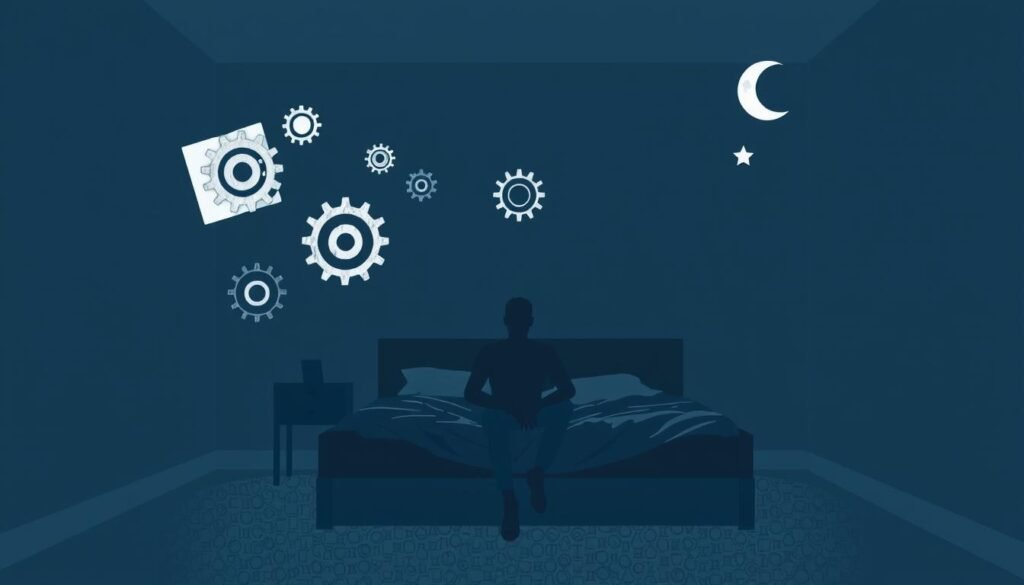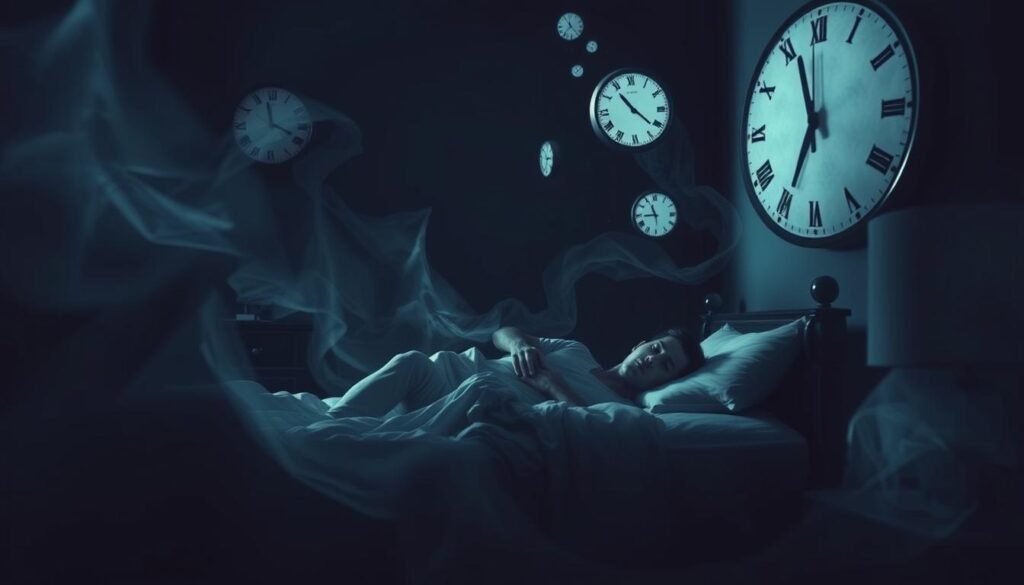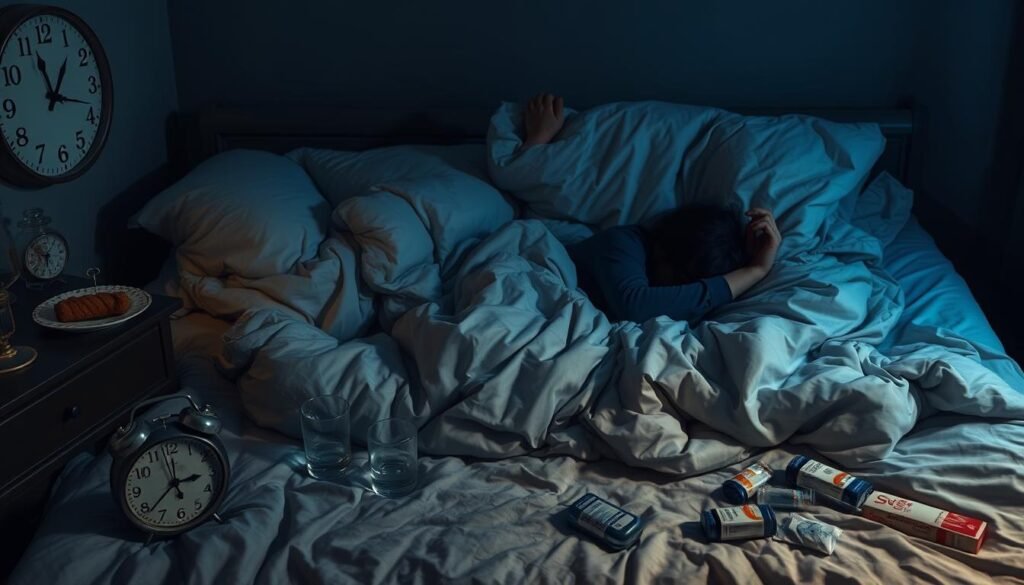About 40% of men over 45 suffer from low testosterone, which harms their sleep. This condition can drain your energy, mess up sleep, and cause more issues. Experts from the National Sleep Foundation say adults need 7-9 hours of good sleep every night. But, for those with low testosterone insomnia, this is tough.
Sleeping less because of low testosterone starts a hard cycle. It causes more sleep trouble, makes cortisol levels go up, and lowers testosterone more.
Insomnia isn’t just annoying; it’s a real sleep problem that can come from things like hormone issues. The link between testosterone and sleep shows we need good treatments. Solutions like the ones SynergenX Health offers are important. They create special plans that might bring back normal sleep and make health better.
Key Takeaways
- Low testosterone affects nearly 40% of men over 45, significantly impacting their sleep quality.
- Optimal sleep for adults is 7-9 hours per night; low testosterone can hinder meeting this standard.
- Insomnia is a complex sleep disorder often linked to hormonal imbalances like low testosterone.
- Elevated cortisol levels from chronic sleep disturbances can further decrease testosterone production.
- Testosterone replacement therapy may alleviate sleep issues connected to low testosterone levels.
- Individualized treatment options are crucial for effectively managing sleep problems related to hormonal imbalances.
Understanding Testosterone and Its Importance
Testosterone is key for many body functions in both men and women. It affects reproductive health, from sex drive to fertility. It also helps control our moods, making us feel stable and mentally well.
Strong bones need testosterone. It makes bones denser, fighting off osteoporosis. While men make it in their testicles, women produce it in their ovaries and adrenal glands. This shows how crucial testosterone is for everyone, keeping our hormone system in balance.
Testosterone levels change through life. In men, they’re highest in young adulthood then drop slightly each year. Women’s levels also shift due to their menstrual cycle and menopause. It’s important to keep these levels steady. If not, it might cause health problems like poor mood, weaker bones, and fertility issues.
Defining Low Testosterone Levels
Low testosterone, or hypogonadism, leads to not having enough testosterone. This hormone is key for many body functions. Doctors use blood tests to check testosterone levels. For men, under 300 ng/dL is low. For women, it’s under 15 ng/dL. Knowing these levels helps spot low testosterone symptoms. These can include less interest in sex, feeling tired, getting upset easily, and losing muscle.
Many things can cause low testosterone. Being sick for a long time, being overweight, and getting older are the main ones. Research shows that men with low testosterone sleep poorly. They wake up a lot at night. This bad sleep can make symptoms worse and upset the body’s hormone balance.

Being overweight is a big deal; it’s linked to low testosterone. A study with 1,312 men found those with higher weights had worse sleep. This shows why it’s important to keep an eye on testosterone levels. This is especially true for those who might get hypogonadism.
It’s critical to know about low testosterone and its causes to take care of your health. Because its symptoms are similar to other health problems, seeing a doctor is a good idea. To learn more about how hormonal changes can affect sleep, check out this article on hormonal imbalances and.
| Condition | Men’s Testosterone Level (ng/dL) | Women’s Testosterone Level (ng/dL) |
|---|---|---|
| Low Testosterone | Below 300 | Below 15 |
| Normal Testosterone | 300-1000 | 15-70 |
Low Testosterone Insomnia: The Connection
Understanding how low testosterone affects sleep is crucial for those with sleep problems. Studies show a clear link between low testosterone and changes in sleep, especially REM sleep. REM sleep is important for replenishing hormones, including testosterone.
Testosterone levels drop as men get older, which can make sleep issues worse. By age 30, these levels go down about 1 percent every year. This decrease is more noticeable in middle-aged and older men, leading to insomnia and bad sleep quality.

Low testosterone makes it hard to fall asleep and can worsen sleep apnea and restless leg syndrome. Keeping testosterone levels normal is key for good sleep. Men who don’t get 7 to 9 hours of sleep each night often have lower testosterone levels. Not sleeping enough can reduce testosterone production, creating a tough cycle that impacts well-being.
Creating a good sleep environment and sticking to a regular sleep schedule can improve sleep quality. Exercising, limiting alcohol, nicotine, and caffeine, and keeping a healthy weight can help lessen the effects of low testosterone on sleep.
| Factor | Impact on Testosterone |
|---|---|
| Age | Decreases approximately 1% per year after age 30 |
| Sleep Quality | Insufficient sleep can lower testosterone production |
| Exercise | Regular activity may improve testosterone levels |
| Weight | Being overweight can negatively affect sleep quality |
| Hormonal Balance | Low testosterone often increases cortisol levels |
In conclusion, managing low testosterone and insomnia by making lifestyle changes and understanding hormonal impacts on sleep can improve sleep quality and health.
Symptoms of Low Testosterone
It’s vital to spot the signs of low testosterone in both genders. These symptoms can greatly affect one’s health and life happiness. They include both physical and emotional signs. These can make everyday life and feelings of well-being harder.
Impact on Men
Men may face fatigue, trouble with erections, and changes in desire. These problems can make them feel less than or frustrated. They might also feel sad or easily annoyed. Trouble with thinking clearly or remembering things can occur too.
It’s key to get checked if you think hormones are to blame. Low testosterone might link to diseases like diabetes and heart issues. This makes understanding it even more crucial. For extra details on these symptoms, check out this resource.
Impact on Women
Women also deal with low testosterone symptoms like tiredness and big changes in libido. Mood issues can also arise, not just from stress or the mind, but from hormone imbalances. Tiredness can mix with having low energy, making one feel sad.
It’s important for women to see these signs as possible hormone issues, not just mental ones. Speaking to a health expert can help. For more on how not sleeping well affects health, see this information.

Hormonal Imbalance and Sleep Disorders
Hormonal imbalance greatly affects sleep, especially insomnia. Stress, obesity, and aging can change hormone levels, making it hard to sleep well. 35% of adults show signs of insomnia, with almost 20% facing short-term issues. Insomnia is more common among women approaching menopause, with 42% having sleep troubles.
Testosterone is key for sleep rhythms. It spikes during the first REM cycle. Without enough testosterone, sleep can be cut short. Middle-aged men with sleep problems may see a big drop in testosterone. This change can increase the risk of metabolic issues and sleep apnea.
Insomnia can link to high cortisol, often due to stress and late-night tech use. High cortisol can mess with melatonin, which controls sleep cycles. Treatments like CBT-I help fix the habits causing bad sleep. Also, good sleep routines are crucial for tackling insomnia. They help improve sleep and overall health, as explained on this site.
To solve these sleep issues, hormone therapy might help by balancing hormones. Women, particularly, struggle with sleep during times like menstruation and menopause. It’s important to see how hormones and sleep issues are interlinked. Doing so can help enhance sleep quality and health overall.
The Biological Link Between Testosterone and Sleep
The link between testosterone and sleep is important for our health. Research shows this relationship helps keep hormone levels right. Testosterone is mostly made during REM sleep, when we dream and rest deeply.
Not sleeping well can lower our testosterone levels. For example, sleeping only five hours a night can drop levels by up to 15 percent. This can make someone feel much older than they really are, taking away their energy.
Having a regular sleep schedule helps our bodies make testosterone. But, bad sleep can mess up this process. This leads to health problems like insomnia and less desire for romance. Not getting enough sleep affects many, with one in three Americans facing this issue.
Stress and too much artificial light also harm our sleep and hormones. High stress raises cortisol, which lowers testosterone. Managing stress and practicing mindfulness can help improve both mood and sleep quality.
As we get older, testosterone drops, which changes how we sleep. Less deep sleep and REM sleep are common. These changes make testosterone levels fall even more and can cause sleep disorders like sleep apnea. Understanding this connection helps us see how our bodies work as a whole. For more info about stress and sleep, check out this resource.
Effects of Obstructive Sleep Apnea on Testosterone Levels
Obstructive Sleep Apnea (OSA) affects testosterone levels in people. This condition is common and linked to obesity, which can lower testosterone. Obesity is common in OSA patients and impacts testosterone production.
Studies show a link between OSA severity and testosterone levels. People with moderate to severe OSA have lower testosterone than those with mild OSA or who only snore. The Apnea-Hypopnea Index (AHI) categorizes OSA severity.
| OSA Severity | AHI Score |
|---|---|
| Mild | 5-15 |
| Moderate | 15-30 |
| Severe | >30 |
Severe OSA does more than make you tired. It causes mental and physical fatigue, reducing activity. This can lower testosterone levels even more. The Oxygen Desaturation Index (ODI) shows that worse hypoxia at sleep affects testosterone levels.
OSA treatments like CPAP and losing weight can help normalize testosterone. Surgery can also improve levels and sexual function in three months. These methods show promising results for patients.
However, using testosterone replacement therapy (TRT) in untreated OSA patients raises concerns. While TRT could help, it might also cause problems. It’s vital to have a full OSA treatment plan before starting testosterone therapy.
Testosterone Replacement Therapy: Benefits and Risks
Testosterone replacement therapy (TRT) can help men with low testosterone because of hypogonadism. Testosterone usually peaks in young adulthood and drops about 1% every year after 30. This decline can reduce sexual desire, change emotions, and alter body shape.
TRT can greatly improve life for those affected. It can boost mood, give more energy, and improve sexual health. It can also lead to better sleep.
- Improved mood and emotional stability
- Increased energy levels
- Enhanced sexual function
- Better sleep quality
However, TRT isn’t without risks. It could make sleep apnea and heart problems worse. Other risks include skin and prostate issues, less sperm, and higher clotting and heart disease risks.
- Worsening of acne and benign prostatic hyperplasia
- Growth of prostate cancer
- Reduced sperm production and testicular shrinkage
- Increased clotting risks due to elevated red blood cell production
- Potential heart disease risk
The American College of Physicians notes improved sexual function but little proof of more energy for healthy, older men. Talking to a doctor before starting is vital. In the U.S., only about 5% of men with hypogonadism get treated, showing a need for more awareness.
| Aspect | Benefits | Risks |
|---|---|---|
| Emotional Health | Improved mood | Potential for worsening emotional instability |
| Energy Levels | Increased energy | Not universally effective for vitality |
| Sexual Function | Enhanced libido | Possible exacerbation of prostate issues |
| Sleep Quality | Better sleep patterns | Risk of worsening sleep apnea |
In conclusion, TRT has many benefits for managing hypogonadism but the risks must be carefully weighed. Consulting healthcare professionals is key to a well-informed treatment plan.
Lifestyle Changes to Improve Sleep Quality
Want better sleep? Start with changing your lifestyle. Taking steps to improve your routine boosts testosterone and well-being. Focus on what you eat, how you move, and handling stress. Doing this can make your sleep and health better.
Nutrition and Exercise
What you eat matters for sleep. A balanced diet with calcium, magnesium, and vitamins helps your hormones and sleep. Add regular exercise like running or resistance training. It strengthens sleep quality, eases anxiety, and supports testosterone. This combo makes restful sleep easier to come by.
Stress Management Techniques
Managing stress is key for good sleep. Practices like mindfulness, deep breathing, or yoga help. They make you relax, leading to better sleep. Making these a part of your day can lower anxiety and calm your mind. These changes improve sleep and health, helping you tackle stress better.